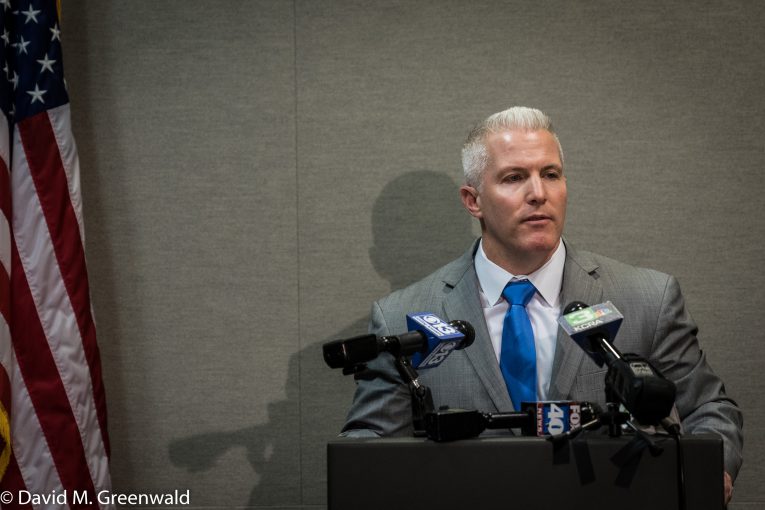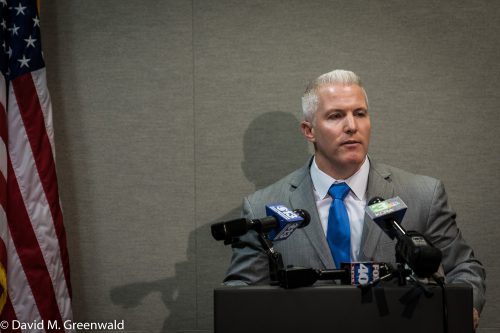

It was a strange and unexpected ruling that sent shock waves through the Davis and Yolo County community. An appellate court has ruled that Daniel Marsh, convicted of a double murder in Davis as a teenager, is entitled to have a juvenile court hearing that was originally bypassed, to determine whether he should have been prosecuted in adult court.
The original court verdict has been set aside while the juvenile court judge makes the determination as to whether he was suitable for treatment in juvenile court or if he should remain in adult court.
If a judge were to determine that Mr. Marsh, who brutally stabbed the elderly couple of Chip Northup and his wife Claudia Maupin while they slept in their Davis home on April 13, 2013, is better suitable for adult court, the original conviction and 52 to life sentence would be reinstated.
It makes for dramatic news coverage, but the reality is that nothing is going to change. Indeed, the appellate court comments that “it could be argued that it is not even remotely probable that the juvenile court would find the present defendant suitable for juvenile court.”
That hasn’t stopped DA Jeff Reisig from using this case as another launching point to attack Propostion 57.
At the time of the original trial, the Yolo County DA’s office had the authority to “direct file” Mr. Marsh’s case in adult court. But under Prop. 57, passed in November 2016, direct filing of 
juvenile cases in adult court has been eliminated.
Under Prop. 57, all criminal matters that involve juvenile defendants begin in a delinquency court which has a hearing to determine whether or not to transfer the defendant to adult court.
But here’s the thing: Daniel Marsh’s case may deserve the right to due process under the current law, but this is not a close call.
According to the law, the judge would consider five criteria to determine whether the defendant qualifies for juvenile court. These are the degree of criminal sophistication, capacity for rehabilitation, previous delinquency history, success of prior rehabilitation attempts, and the circumstances and gravity of the alleged offense.
Under at least four of those criteria, any objective evaluation of Daniel Marsh is going to demonstrate there is no possible way that he is going to qualify for juvenile consideration.
In a 12-page court ruling, the appellate justices note: “The People concede that this initiative applies retroactively to defendant’s pending appeal, and that we must conditionally reverse for proceeding in juvenile court.”
They add, “Although it could be argued that it is not even remotely probable that the juvenile court would find the present defendant suitable for juvenile court, the People do not object to a conditional reversal and remand for the juvenile court to rule on the issue.”
This fact has not stopped District Attorney Jeff Reisig from getting on his soap box to use the ruling to once against attack Prop. 57.
This another case where Jeff Reisig’s views are at odds with Yolo County. Mr. Reisig, like pretty much all of the state’s district attorneys, strongly opposed the proposition. But the voters in Yolo County overwhelmingly approved it 68-32.
He, along with Supervisors Jim Provenza and Matt Rexroad, wrote a letter in November 2016 published in the local papers opposing Prop. 57. They warned that “this loophole will make eligible for early release into our communities criminals who have committed” a number of crimes they deemed serious.
Prop. 57 follows “on the heels of Gov. Brown’s realignment scheme that has reduced state prison populations by tens of thousands of inmates who are instead housed in overcrowded county jails or have been released onto the street. It also follows another soft-on-crime criminal justice experiment, Proposition 47, which has reduced numerous felonies to misdemeanors.”
He quickly issued a statement to the media following this decision: “It’s really disappointing, because this case highlights one of the serious flaws with Prop. 57.” He added, “I don’t think the voters ever would have contemplated that this killer would be a beneficiary.”
Except that he is not going to be a beneficiary. Yes, he gets his hearing. Yes, it will be a temporary inconvenience, but once again, as the court indicated, “it could be argued that it is not even remotely probable that the juvenile court would find the present defendant suitable for juvenile court.”
As we pointed out, on at least four of the five criteria that they use for review, he fails. So why the hand wringing? If the defendant is entitled to a hearing and his due process, let him have it and then let the system work as it is supposed to. In the end, Mr. Reisig wants to be able to make the sole determination as to whether someone should be tried as a juvenile and adult.
In the Daniel Marsh matter, it does not make a difference who makes that call. In other matters, juveniles with no record and fairly minor charges against them have been held in adult court. We have covered numerous cases where the minors spend several years in the system held in custody, charged as adults with no oversight as to whether or not they should be in the adult system. They then get acquitted outright or convicted of lesser crimes and revert to the juvenile system – but they have lost a lot of time and opportunity in the meantime.
Daniel Marsh is not such a case, he’ll quickly be denied, have his sentence reimposed, and go back to serving his time in prison. We shouldn’t fear due process or discretion. Neither should the elected district attorney.
—David M. Greenwald reporting


““I don’t think the voters ever would have contemplated that this killer would be a beneficiary.”
Mr. Reisig is using a fear tactic in the Marsh case. He is overlooking the status of “mentally disordered offender”. Even if the five criteria cited by David were met, this does not alter the fact that Mr. Marsh factually committed the crime of murder. He also carried psychiatric diagnoses at the time of his arrest and conviction. Therefore, regardless of his status as juvenile or adult, he would fall into the category of “mentally disordered offender” and if qualified for “discharge” from prison, he would be “discharged” to Atascadero State Hospital, not into the general population. Hearings would be held every two years with discharge to an unlocked facility extremely unlikely given the nature of his crime. Information per my in house consultant. I am sure that Mr. Reisig is well aware of this circumstance.
I agree it’s a fear tactic. The problem I have is he is using this case to argue against Prop 57 when, as long as there isn’t a shocking verdict, you could argue Prop 57 is working as intended. They didn’t want the DA to have the authority to unilaterally direct file. That doesn’t mean there aren’t times to charge minors as adults.
Reisig neglects to mention that he used his authority to direct filed teens in Yolo County, who were then eventually acquitted of the charges and summarily released, but after spending 2 years in the confines of Juvenile Hall while their case wound through the adult criminal court system. The depravity of Marsh’s crime make him unsuitable for juvenile services and this should be almost an administrative task. Reisig’s message should be one of reassurance, not one creating fear and apprehension.
“Reisig’s message should be one of reassurance, not one creating fear and apprehension.”
Well said, Sharla
Sharla… you point out it is the general problem… and I agree…
Can we focus on that rather than an individual case? Please?
Playing devil’s advocate… perhaps the DA feels a need, correctly or incorrectly, to point out he was operating under the “then rules”, not the “now rules”… and has made that point clumsily, to say the least. A clumsy ‘defensive posture’?
This a procedural matter/issue, irrespective of the specific case (although it is true a specific case raised the issue). Let’s try to remember that. Please.
I think he clearly prefers the “then” rules rather than the “now” rules and is trying to use this case to bolster his point.
I opine that both may be ‘working’ in his mind… combination of ‘conviction’ (pun unintended), and CYA… just an opinion…
I disagree
Fine.
Read the Enterprise article where they quote the victims’ family. Sharla is absolutely right, he is spreading fear in the name of righteousness and scaring out of people that he could simply reassure that there is no chance that this will be undone – because there isn’t – at least on this account. I still think they are vulnerable on the confession.
Which “they”? Prosecution or defense?
They being the prosecution as they got the confession ruled admissible by the trial judge. I think it was extremely questionable
Thank you for the clarification…
The process question, and outcome of that is the only matter in question… no new evidence, no new arguments, no re-retrial…